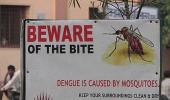Vector-borne diseases dengue and Chikungunya are wreaking havoc on public health in India, especially the national capital.
Dengue cases have reached alarming proportions in states like West Bengal, Kerala, Uttar Pradesh and Telangana.
According to recent figures, over 1,057 cases of Chikungunya have been recorded till September 10, while a whopping 1,158 cases of dengue have been reported in the national capital for the same time period.
As the city battles with the diseases, here’s what you should know about them and how to combat the illness.

DENGUE
What is dengue?
Dengue is a disease caused by any one of four closely related dengue viruses (DENV 1, DENV 2, DENV 3, or DENV 4). The viruses are transmitted to humans by the bite of an infected mosquito. In the western hemisphere, the Aedes aegypti mosquito is the most important transmitter or vector of dengue viruses.
What are the symptoms of the disease?
The principal symptoms of dengue fever are high fever, severe headache, severe pain behind the eyes, joint aches, muscle and bone pain, rash, and mild bleeding (e.g., nose or gums bleed, easy bruising).
When developing into severe dengue, the critical phase takes place around three-seven days after the first sign of illness. Temperature will decrease; this does not mean the person is necessarily recovering. On the other hand, special attention needs to be given to warning signs such as severe abdominal pain, persistent vomiting, bleeding gums, rapid breathing and fatigue.
When severe dengue is suspected, the person should be rushed to the emergency room or to the closest health care provider.
How can someone get dengue fever?
Dengue fever occurs following the bite of an infected mosquito Aedes aegypti. This type of mosquito has a peculiar white spotted body and legs and is easy to recognise even by laymen.
It breeds in clean water and has a flight range of only 100-200 metres. The mosquito gets the dengue virus after biting a human being infected with dengue virus.

Can someone get dengue fever from another person?
Dengue does not spread directly from person to person. It is only spread through the bite of an infected mosquito.
What is the treatment for dengue?
There is no vaccine or specific medication for dengue fever.
Patients should seek medical advice, rest and drink plenty of fluids. Paracetamol can be taken to bring down fever and reduce joint pains. However, aspirin or ibuprofen should not be taken since they can increase the risk of bleeding.
What should I do if I suspect I have dengue?
If you suspect you have dengue you need to see a doctor immediately.
What can be done to reduce the risk of acquiring dengue?
There is no vaccine for preventing dengue. The best preventive measure is to eliminate the places where the mosquito lays her eggs, primarily artificial containers that hold water.
Items that collect rainwater or to store water should be covered or properly discarded.
Pet and animal watering containers and vases with fresh flowers should be emptied and cleaned at least once a week. This will eliminate the mosquito eggs and larvae and reduce the number of mosquitoes present in these areas.
Using air conditioning or window and door screens reduces the risk of mosquitoes coming indoors.
Proper application of mosquito repellents decreases the risk of being bitten by mosquitoes.
CHIKUNGUYA
What is chikungunya?
Chikungunya is a relatively rare form of viral fever transmitted to humans by infected mosquitoes. Typically the Aedes Aegypti mosquito spreads the disease. The World Health Organisation says there are also other competent mosquito vectors that infect the disease that are found in Africa, South-East Asia, southern India and Pakistan. Primarily, it occurs during the rainy season.
Why the name Chikungunya?
Chikungunya comes from the Swahili language for stooped walk, reflecting the physique of a person suffering from the disease.
What are the symptoms of the disease?
The symptoms of Chikungunya appear between four and seven days after the mosquito bite. A high fever and headache occur, with significant pains in the joints (ankles, wrists) that can persist for several weeks. The joints of the extremities in particular become swollen and painful to touch. A rash may sometimes occur.
Haemorrhage is rare and all but a few patients recover within three to five days. Some can suffer from joint pain for months.
What is to be done to prevent Chikungunya?
The main preventive measure is to stop the proliferation of mosquitoes by eliminating their breeding grounds.









